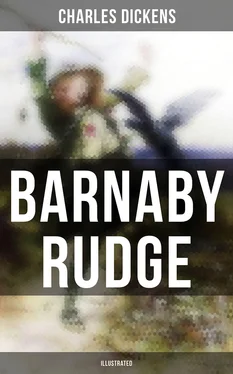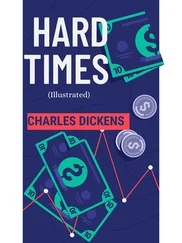‘I sat down to trim the candle, and when I had done so I could not persuade myself to get up again, and go about my work. I don’t know how it was, but I thought of all the ghost stories I had ever heard, even those that I had heard when I was a boy at school, and had forgotten long ago; and they didn’t come into my mind one after another, but all crowding at once, like. I recollected one story there was in the village, how that on a certain night in the year (it might be that very night for anything I knew), all the dead people came out of the ground and sat at the heads of their own graves till morning. This made me think how many people I had known, were buried between the church-door and the churchyard gate, and what a dreadful thing it would be to have to pass among them and know them again, so earthy and unlike themselves. I had known all the niches and arches in the church from a child; still, I couldn’t persuade myself that those were their natural shadows which I saw on the pavement, but felt sure there were some ugly figures hiding among ‘em and peeping out. Thinking on in this way, I began to think of the old gentleman who was just dead, and I could have sworn, as I looked up the dark chancel, that I saw him in his usual place, wrapping his shroud about him and shivering as if he felt it cold. All this time I sat listening and listening, and hardly dared to breathe. At length I started up and took the bell-rope in my hands. At that minute there rang—not that bell, for I had hardly touched the rope—but another!
‘I heard the ringing of another bell, and a deep bell too, plainly. It was only for an instant, and even then the wind carried the sound away, but I heard it. I listened for a long time, but it rang no more. I had heard of corpse candles, and at last I persuaded myself that this must be a corpse bell tolling of itself at midnight for the dead. I tolled my bell—how, or how long, I don’t know—and ran home to bed as fast as I could touch the ground.
‘I was up early next morning after a restless night, and told the story to my neighbours. Some were serious and some made light of it; I don’t think anybody believed it real. But, that morning, Mr Reuben Haredale was found murdered in his bedchamber; and in his hand was a piece of the cord attached to an alarm-bell outside the roof, which hung in his room and had been cut asunder, no doubt by the murderer, when he seized it.
‘That was the bell I heard.
‘A bureau was found opened, and a cash-box, which Mr Haredale had brought down that day, and was supposed to contain a large sum of money, was gone. The steward and gardener were both missing and both suspected for a long time, but they were never found, though hunted far and wide. And far enough they might have looked for poor Mr Rudge the steward, whose body—scarcely to be recognised by his clothes and the watch and ring he wore—was found, months afterwards, at the bottom of a piece of water in the grounds, with a deep gash in the breast where he had been stabbed with a knife. He was only partly dressed; and people all agreed that he had been sitting up reading in his own room, where there were many traces of blood, and was suddenly fallen upon and killed before his master.
Everybody now knew that the gardener must be the murderer, and though he has never been heard of from that day to this, he will be, mark my words. The crime was committed this day two-and-twenty years—on the nineteenth of March, one thousand seven hundred and fifty-three. On the nineteenth of March in some year—no matter when—I know it, I am sure of it, for we have always, in some strange way or other, been brought back to the subject on that day ever since—on the nineteenth of March in some year, sooner or later, that man will be discovered.’
Table of Contents
‘A strange story!’ said the man who had been the cause of the narration.—‘Stranger still if it comes about as you predict. Is that all?’
A question so unexpected, nettled Solomon Daisy not a little. By dint of relating the story very often, and ornamenting it (according to village report) with a few flourishes suggested by the various hearers from time to time, he had come by degrees to tell it with great effect; and ‘Is that all?’ after the climax, was not what he was accustomed to.
‘Is that all?’ he repeated, ‘yes, that’s all, sir. And enough too, I think.’
‘I think so too. My horse, young man! He is but a hack hired from a roadside posting house, but he must carry me to London to-night.’
‘To-night!’ said Joe.
‘To-night,’ returned the other. ‘What do you stare at? This tavern would seem to be a house of call for all the gaping idlers of the neighbourhood!’
At this remark, which evidently had reference to the scrutiny he had undergone, as mentioned in the foregoing chapter, the eyes of John Willet and his friends were diverted with marvellous rapidity to the copper boiler again. Not so with Joe, who, being a mettlesome fellow, returned the stranger’s angry glance with a steady look, and rejoined:
‘It is not a very bold thing to wonder at your going on to-night. Surely you have been asked such a harmless question in an inn before, and in better weather than this. I thought you mightn’t know the way, as you seem strange to this part.’
‘The way—’ repeated the other, irritably.
‘Yes. DO you know it?’
‘I’ll—humph!—I’ll find it,’ replied the man, waving his hand and turning on his heel. ‘Landlord, take the reckoning here.’
John Willet did as he was desired; for on that point he was seldom slow, except in the particulars of giving change, and testing the goodness of any piece of coin that was proffered to him, by the application of his teeth or his tongue, or some other test, or in doubtful cases, by a long series of tests terminating in its rejection. The guest then wrapped his garments about him so as to shelter himself as effectually as he could from the rough weather, and without any word or sign of farewell betook himself to the stableyard. Here Joe (who had left the room on the conclusion of their short dialogue) was protecting himself and the horse from the rain under the shelter of an old penthouse roof.
‘He’s pretty much of my opinion,’ said Joe, patting the horse upon the neck. ‘I’ll wager that your stopping here to-night would please him better than it would please me.’
‘He and I are of different opinions, as we have been more than once on our way here,’ was the short reply.
‘So I was thinking before you came out, for he has felt your spurs, poor beast.’
The stranger adjusted his coat-collar about his face, and made no answer.
‘You’ll know me again, I see,’ he said, marking the young fellow’s earnest gaze, when he had sprung into the saddle.
‘The man’s worth knowing, master, who travels a road he don’t know, mounted on a jaded horse, and leaves good quarters to do it on such a night as this.’
‘You have sharp eyes and a sharp tongue, I find.’
‘Both I hope by nature, but the last grows rusty sometimes for want of using.’
‘Use the first less too, and keep their sharpness for your sweethearts, boy,’ said the man.
So saying he shook his hand from the bridle, struck him roughly on the head with the butt end of his whip, and galloped away; dashing through the mud and darkness with a headlong speed, which few badly mounted horsemen would have cared to venture, even had they been thoroughly acquainted with the country; and which, to one who knew nothing of the way he rode, was attended at every step with great hazard and danger.
The roads, even within twelve miles of London, were at that time ill paved, seldom repaired, and very badly made. The way this rider traversed had been ploughed up by the wheels of heavy waggons, and rendered rotten by the frosts and thaws of the preceding winter, or possibly of many winters. Great holes and gaps had been worn into the soil, which, being now filled with water from the late rains, were not easily distinguishable even by day; and a plunge into any one of them might have brought down a surer-footed horse than the poor beast now urged forward to the utmost extent of his powers. Sharp flints and stones rolled from under his hoofs continually; the rider could scarcely see beyond the animal’s head, or farther on either side than his own arm would have extended. At that time, too, all the roads in the neighbourhood of the metropolis were infested by footpads or highwaymen, and it was a night, of all others, in which any evil-disposed person of this class might have pursued his unlawful calling with little fear of detection.
Читать дальше












